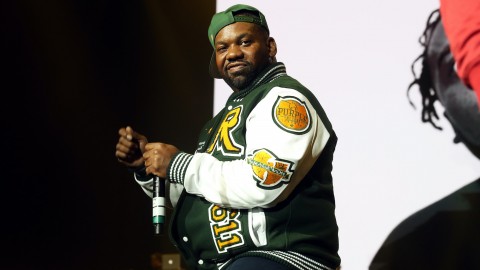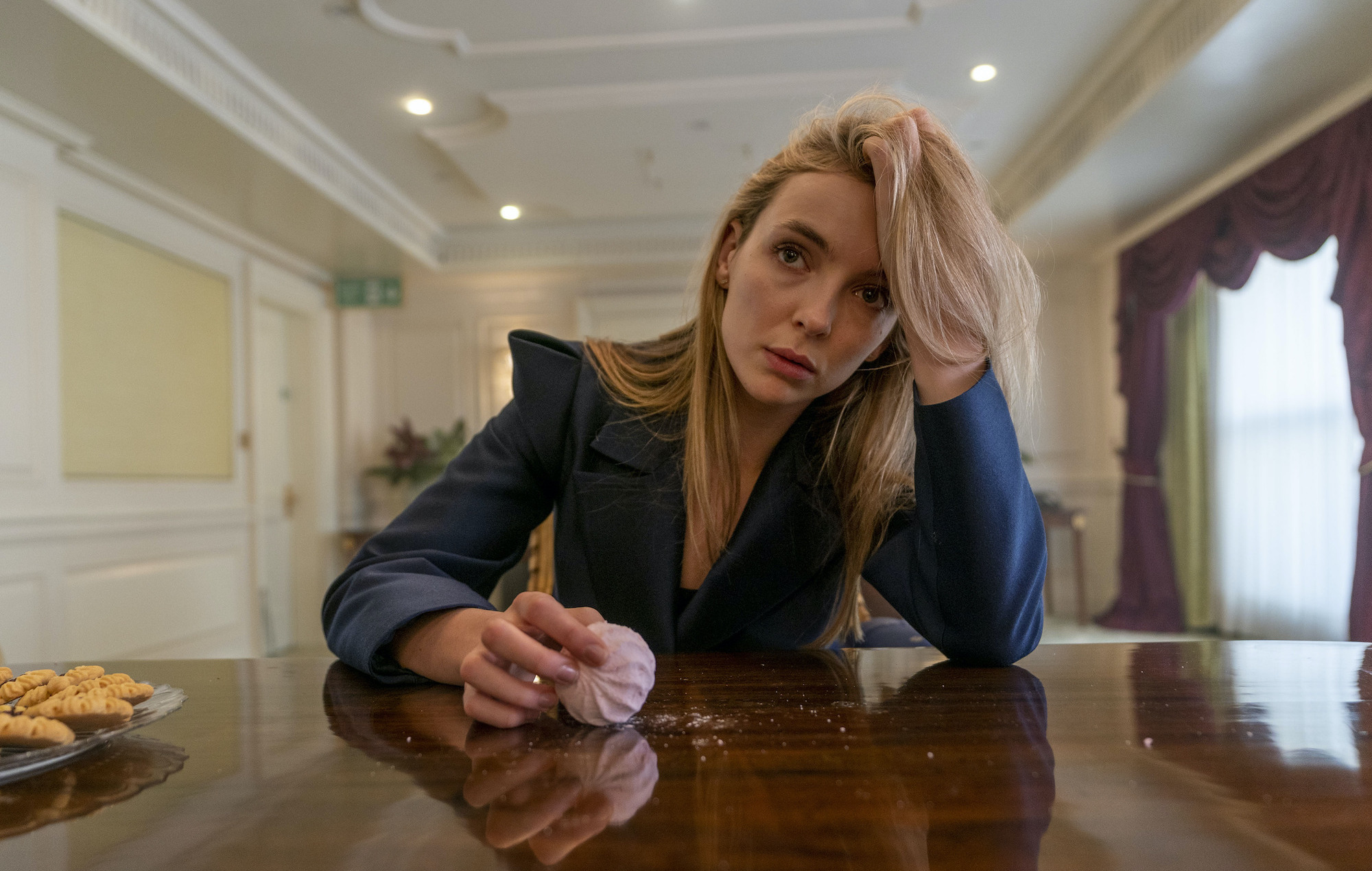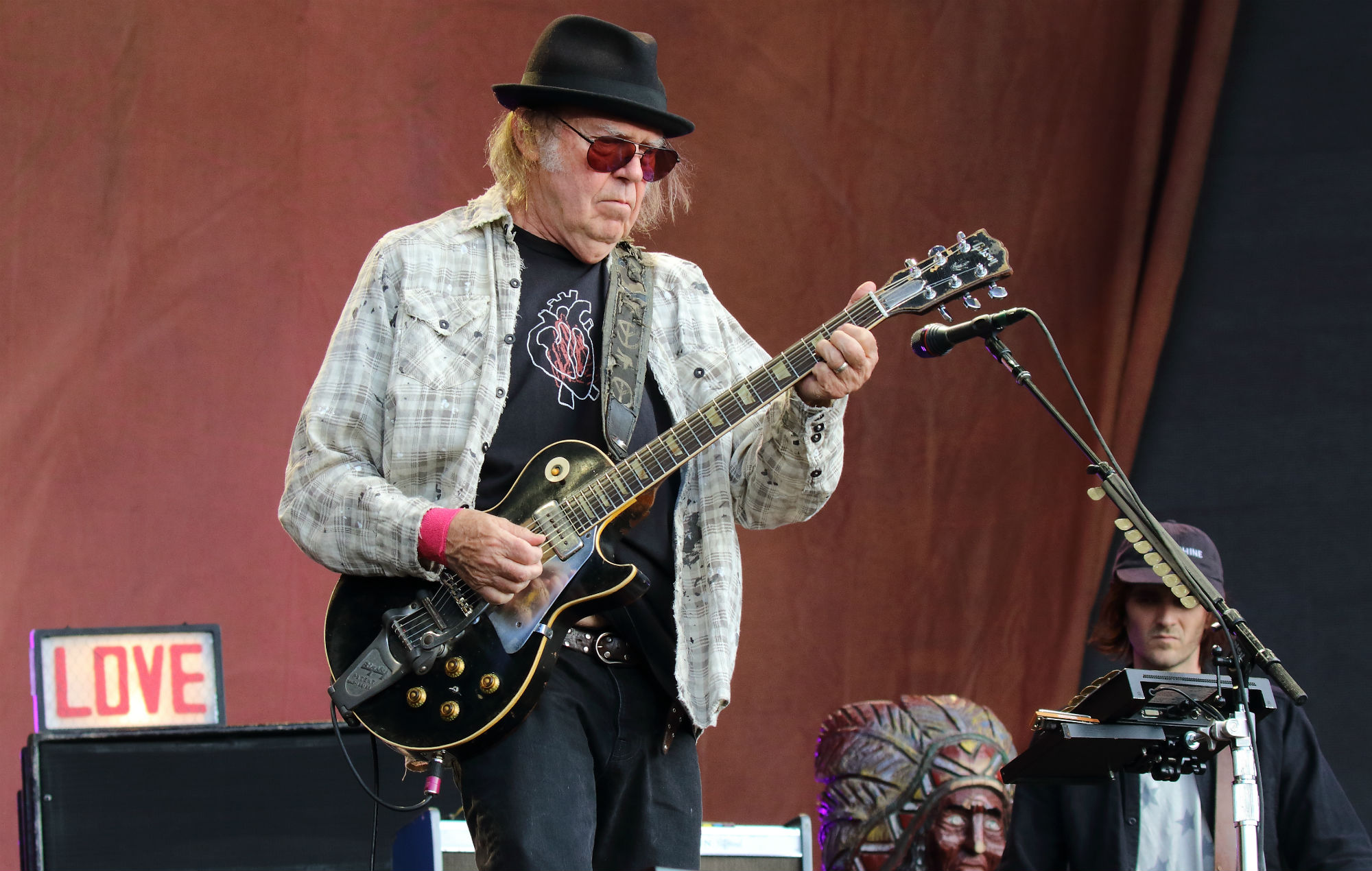It feels like a miracle to be talking to Joe Seaward, drummer of Oxford’s indie quartet Glass Animals. His bandmates tell NME it is a miracle. Seaward himself is certain it is. “I think that my accident shook everyone to the core,” he says, balancing his head in his hand, his fingertips tracing the outline of a deep scar on his skull. “Everyone was very close to losing a friend, a brother, a boyfriend, a son and a bandmate.” His eyes fill with tears.
In July 2018, Seaward was hit by a truck while riding his bike in Dublin. As well as a severely broken leg, Seaward suffered brain damage after a complex skull fracture: he required two lengthy, life-threatening operations to repair the damage. On waking, he found that he had no short-term memory. He couldn’t walk, talk, eat, read or write. “Everything that made me… me was taken away,” Seaward says. “And I couldn’t even remember why.”

NME is talking to the musician via an online video call, alongside his bandmates, frontman Dave Bayley, guitarist Drew MacFarlane and bassist Ed Irwin-Singer. The group should be on tour right now, but that came to an abrupt end after a gig in Hollywood last month, when the coronavirus crisis escalated. Now, they’re each in lockdown at their respective homes, working on a series of quarantine covers (so far they’ve covered the likes of Nirvana, Lana Del Rey and Bill Withers) to pass the time.
It’s a bitter time for the group. After two years of rehabilitation, Seaward had returned to performing following a series of warm-up gigs earlier this year. Bayley says that being back on stage in February was the greatest feeling: “It felt like a miracle and it was a miracle really. At one of our first shows in Manchester, everything clicked again. I remember just being so thankful that we could still do this. I couldn’t stop thinking about how lucky we were.”
Reviewing that gig, NME said: “The loudest and longest audience ovation is reserved for Seaward when he finally appeared on stage. An extended applause leaves everybody, band and audience, visibly moved.” Seaward is overwhelmed recalling the experience. “I was completely shocked by the reaction. It was more than joyous to get to that point: it was amazing and I still feel emotional thinking about it.”
Irwin-Singer and MacFarlane agree. “It really was a cathartic moment,” Irwin-Singer says. “We really didn’t know if Joe would ever return.”

The events triggered an about-turn for the group: their upcoming new album, ‘Dreamland’, will be their first entirely autobiographical record. The group’s genre-fluid style, first aired on their 2014 album ‘Zaba’, combines dance, American R&B and poppy electronica, and usually sees Bayley, the group’s main songwriter, explore the lives of others. For their previous record, ‘How To Be A Human Being’, Bayley interviewed dozens of strangers he’d met on the road – everyone from fans to taxi drivers – and used their stories to create a bunch of fictional characters. It earned the group their first Mercury nomination.
“The last album saw me digging into other people’s lives and asking them quite heavy questions – quite probing stuff that I probably shouldn’t have asked,” Bayley says. “The people I spoke to were amazingly open and at the end of all that, I thought it wasn’t fair I was asking them to do this and not myself.” Only one song on the album was personal to Bayley – the emotive closer, ‘Agnes’, which tells the story of a close friend who died from suicide. It received a staggering response from fans.
“The fan response to ‘Agnes’ was totally unexpected,” Bayley says. “I’ve always been really, really afraid to write about myself. I always thought it was selfish.”

Initially, the group couldn’t talk about the death of their friend publicly – nor to each other. “It was just far too painful,” Irwin-Singer explains. “That song really connected with people in a way that none of us thought it would and that led to a moment where we all sat down and talked.”
Bayley agrees. “It triggered a change for us. A switch kind of turned and I realised it was okay to talk about how things made me feel.” Performing the song live was still a challenge, however. “I broke down and cried,” he continues, remembering the song’s first live outing. “It would still hit me in the gut. It basically got to the point where I couldn’t take it any more. We stopped playing it live for a while.”
Glass Animals’ close bond dates all the way back to their teens. Bayley spent the first 13 years of his life in the US (first in Massachusetts and then in Texas) before moving to Oxford with his family. He met MacFarlane – who was also raised in the US – on his first day at school in the UK and the two immediately bonded over music. Later, he got to know Seaward and Irwin-Singer through gigs and record store signings.
“Dr. Dre’s music makes you feel like you can be anybody” – Dave Bayley
“I went to record in-stores in the middle of the day, skipping school,” Bayley says. “Foals did loads of them. That’s how I found the other boys. Joe and I actually hung out properly for the first time at Reading Festival. He just came up to me after school and asked if I was going. We went, smoked a lot of weed – in a sea of vomit, ecstasy and pheromones. It was brilliant!”
On hearing of Seaward’s accident, Bayley dropped everything and flew to Dublin to be at his bedside. While Seaward’s family initially tried to reassure his bandmates that everything was OK, Bayley knew that his childhood friend’s life hung in the balance. Before his career as a musician, Bayley studied medicine and later neuroscience.
“As soon as I walked into the hospital, I knew it was much more serious than Joe’s family realised,” he recalls, saying that the moment still haunts him. “He was placed in a trauma unit that was reserved for the most serious shit and I knew, deep down, that this could go either way.”

Bayley acted as an intermediary between the medical team and Seaward’s family. “Dave was so important and useful for my family,” Seaward says. “He had a slightly different perspective on everything. He understood the intricacies of brain injuries and when a doctor walked in, Dave explained what it all meant to my family in a way that was helpful and not confusing. He never left my bedside. To have a friend like Dave around was the best thing I could have asked for. Knowing what he did about medicine probably made it even scarier for him.”
Bayley admits that it did: “Seeing him and realising he couldn’t speak or move – well, it was another level.” It’s clear the injury is still challenging to talk about. “When Joe talks, even if he’s just listening to me talk about the accident, he starts sweating so much,” he explains. “It triggers something in him; it’s still too much.”
Seaward reddens as he thinks back to the early days after his accident – the ones he can remember, at least. For the most part, those days passed in a fuggy, disorientating haze as he battled daily with his memory. One day a nurse was helping him to use a Zimmer frame as he re-learned how to walk. Seaward suddenly stopped in the middle of the ward and pointed to his broken leg aghast, unable to remember what had happened. He says: “A nurse told me: ‘I’ve been dressing you every day, twice daily for weeks. We told you every day about the broken leg’. I couldn’t remember a thing.”
“I had this pig-headed determination to get better – fast” – Joe Seaward
About the same time, Seaward started work with a speech and language therapist. “I had to practice saying the days of the week in order, like toddler-level stuff,” Seaward remembers. “The biggest frustration was that all the words were there, but the mechanism for being able to say them had completely gone. The part of my brain that deals with language and memory was damaged. I’d get confused in the middle of sentences; I’d forget things that happened half an hour ago. On top of that, I couldn’t walk, I couldn’t eat, I couldn’t go to the toilet. I had to learn to do everything again.”
The memory overwhelms Seaward momentarily, until he starts to talk about the importance of music in his recovery: “I was absolutely determined to drum again. Everyone else was having conversations about whether I would speak again, if I would come out of neurosurgery in a coma, if I’d be paralysed for life. But I just knew, somehow, that I was going to get better. I wanted to get out of that fucking hospital and I just had this pig-headed determination to get better – fast.”
Seaward spent weeks trying to learn drumming rudiments – basic drum patterns and scales – from scratch on a small drum pad. “I needed to find out whether my brain and limbs would coordinate, whether anything was still there or not.” After six weeks, he’d mastered them. “It gave me fuel. I was going to recover from this.”
While Seaward continued with his rehabilitation, Bayley threw himself into music as a means to cope. At first, Bayley says, it was easier to write music for other artists – including Joey Bada$$, Flume, Wale, Khalid and Stara – than for the band. Each of these musicians happened to be working on deeply personal records at the time, which influenced Bayley’s work on ‘Dreamland’. “Helping other people write lyrics about their personal stories helped him,” MacFarlane says. “In helping someone else do that, it gave him the confidence to do it himself.”

‘Dreamland’ sees Bayley revisit his childhood. Going back to that time, he began to understand where his reluctance to write about himself came from: “I was brought up in Texas where you’re born male, you’re born with a penis, you play American football, you don’t talk about your feelings. That’s embedded into the psyche of men there from a very young age. People want you to be a hero, to be strong. To show any sort of vulnerability was a weakness. The title of the album refers to the fact I’d often totally zone out in class at school and start dreaming of weird things just to escape. I felt trapped.”
Vulnerability is palpable on ‘Dreamland’. It encompasses the full spectrum of human emotion on dreamlike songs that soar with lightness and nostalgia (Bayley recorded many of the songs on vintage equipment) but are often much darker lyrically. While still retaining the tropical tinge of their early Alt-J-meets-Hot Chip leanings, ‘Dreamland’ sees Glass Animals more confident in their musical identity, mixing styles assuredly, rather than tentatively, as in the past.
“We really didn’t know if Joe would ever return” – Ed Irwin-Singer
It variously deals with declining mental health and friendships (‘It’s All So Incredibly Loud’); guilt (‘White Pyramids’), sexuality (‘Helium’); and family breakdowns (‘Domestic Bliss’). The album’s harmonious opening nods to The Beach Boys’ ‘Pet Sounds’ – the first album Bayley’s father played to him – and elsewhere to the experimentation of The Beatles’ ‘White Album’, another key touchstone for the record. Bayley’s mother’s voice also recurs throughout via snippets of audio from home videos, bringing poignant flashes of reflection.
“A lot of my favourite books and films take you through lots of different emotions, like Everything Is Illuminated [by Jonathan Safran Foer], Bayley beams. “It’s sad, surreal, joyous – it’s everything. And that’s what I wanted this album to be: a full reflection of life.”

Was it easier sharing such personal stories with his bandmates, given that they’re all so close?
“No, absolutely not,” Bayley laughs. “It’s a lot harder to be personal in front of the people you truly care about. It was a big hurdle for me to get over. Some of these songs are about people my friends know; others are about things people don’t know about me. I really worry about hurting other people and telling other stories for them when maybe I shouldn’t. It’s [sometimes] not my story to tell so I have tried to protect people.”
One of the songs from the new album, ‘Domestic Bliss’, for example, relays a story about his friend’s mother in an abusive relationship.
“I was too young to understand why she had blood on her nose,” Bayley recalls of the harrowing moment. “It was one of the toughest to write because it didn’t feel like my story to tell, but it also felt like a story that needed to be told. At the moment, in the current climate where domestic violence has risen so dramatically under lockdown, it’s a topic that feels more important than ever to talk about.”
“I wanted ‘Dreamland’ to be a full reflection of life” – Dave Bayley
Growing up in the US, Bayley turned to hip-hop as a means to escape an environment that left him unable to express himself. “I remember hearing Dr. Dre for the first time and being like, fuck, ‘This music makes you feel different. This makes you feel like you can be anybody’. I had a boombox and I’d extend the aerial out to try and get the nearest hip-hop channel.”
You can still hear the combination of US and UK musical influences in Glass Animals’ music. It was the US, and not the UK, though, that gave the group their first break. Their debut, ‘Zaba’, went largely unnoticed here. Why do they think they made it in the US first?

“I’ll be honest: when we released our first album, I thought we’d all be going back to our day jobs,” Bayley sighs. “It felt like all these people who’d been telling us music wasn’t a real career were right. We decided to escape to the US for a bit and tour like hell. We just kept going, doing it on a shoestring and then by the end of the tour, [2014 single] ‘Gooey’ climbed the US charts.” The song went Platinum and they suddenly had a large US fanbase.
Seaward admits that the band “didn’t really click” in the UK until after the release of ‘How To Be A Human Being’. He thinks it took time for audiences over here to get used to their varied influences: “People were confused by us. They described us as ‘weird’, something I thought was an asset – not a negative thing. At the time, people needed it to be one thing or another. Now, people are realising that everything is a bit more fluid and that such fluidity can be fucking amazing.”
The group waited for Seaward before they set about recording and planning the next tour. Of his first day back in the studio after his rehabilitation, he says: “It was incredible to be part of the team again. There is no feeling in the world like writing and recording a song and feeling proud of it. I suddenly felt normal again – whatever that means – and like I could help once more.”

Bayley was overjoyed to have his friend back. “It was pretty mind-blowing to see him back and even better than he was before,” he says. “I imagine he finds it even more mind-blowing.”
Now Glass Animals are looking forward to getting out on the road again. In the immediate future, though, they’re busy working on quarantine covers, though Bayley hints at new material. “There’s probably going to be more to come,” he reveals. “A lot that didn’t end up on this record may well end up on something else.”
Instead of balking at the thought of releasing more personal material, he seems to relish the opportunity: “This has given us closure on a really traumatic time. We can finally move on.”
‘Dreamland’ is out on July 10.
The post Glass Animals: “Everything that made me who I am was taken away by the accident” appeared first on NME Music News, Reviews, Videos, Galleries, Tickets and Blogs | NME.COM.










